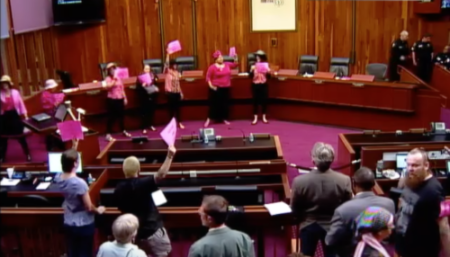State Sen. Amy Galey has introduced a bill that could have a significant impact on Greensboro City Council meetings.
Galey is a first term Republican who represents all of Alamance County and the eastern portion of Guilford County.
The bill is titled, “An Act to Increase the Penalty for Disrupting an Official Meeting of a Public Body.”
In a press release Galey said, “The current law is confusing. It is based on trespass law and focuses on whether a person leaves a public meeting when requested. This new law deals with the conduct that disrupted the public meeting.”
The Greensboro City Council has had a continuing problem with people disrupting its meetings. Whether by shouting, chanting, singing or clapping, organized groups have been disrupting City Council meetings for years.
On May 2, 2017, a group of singing women in pink hats took over the dais after the City Council had left the dais and scurried to the back room where they were protected from the singing women in pink hats by a phalanx of armed police officers and two locked doors.
No one was arrested that night because the women in pink hats and others stopped singing and left the council chambers when they were told to do so by the police.
If this act becomes law, those women in pink hats could be arrested simply for disrupting the meeting, whether they left when they were ordered to leave or not.
As Galey noted, people who have disrupted City Council meetings were only arrested if they refused to leave after being ordered to leave.
This bill, if it becomes law, would allow the Greensboro police to arrest people, not for refusing to leave the meeting, but for disrupting the meeting.
One of the advantages of meeting remotely is that groups cannot disrupt meetings and, when time runs out, a speaker is muted and can’t continue to speak or shout at the City Council. Also, from April through September, Mayor Nancy Vaughan did not allow any speakers during the public forum portion of the meeting, aka speakers from the floor, which resulted in some extremely short meetings, since the primary purpose of the first meeting of the month is to hold a public forum.


Oh heck no! I don’t agree with the pink hats or most of the other turds who interrupt the meetings, but at the same time if our ancestors hadn’t interrupted parliament, or defied the powers that be we would not have the freedoms we all enjoy today. If we cannot assemble peacefully and interrupt the meetings lawfully I suppose further sacrifice will have to be made by doing it unlawfully when necessary. It would appear that tyranny wears many hats in our State Senate. Today’s GOP ain’t what she used to be. If Galey, or anyone else there is scared then you’re in the wrong place. I don’t like watching protests any more than the next person, but maybe there needs to be more effort made to actually listen to their cause before sending them on their way it would remedy half or more of the serious incidents.
Amen…. What D Cluck
Some years ago, a group of parents were arrested for insisting that the board of education listen to their concerns. Tyrants don’t like being bothered by the peasants. I don’t think we are heading in the right direction.
Hell NO! The ability to disrupt “official” meetings is a guarantee of our First Amendment. It was written into the Constitution as the First because it was the MOST IMPORTANT RIGHT we, as citizens, could have since WE THE PEOPLE are the government, the government isn’t lording it over us. They need to be reminded of this.
We are quickly going back to the Middle Ages, a time forgotten as history is no longer taught in schools. We are not serfs, peasants, slaves with no voice in government. We ARE the government. Let’s remind them.
Q & A is fine. Disrupting a meeting so that it cannot continue is not.
When public officials do racist things and allow police to abuse their power then the meeting should interrupted until local officials do the right thing.
Let’s check the receipts – yup, this is a republicans idea of good policy. Notice that it is restricting the vote of legal voters, much like the entire republican strategy to win. Less legal votes, more likely to lead to a republican victory. Less dissent, more likely to pass shit policy.
Don’t need a new law potentially restricting free speech. What’s needed is more consistent enforcement of trespass when not leaving after being asked to do so by law enforcement.